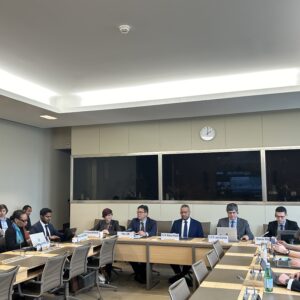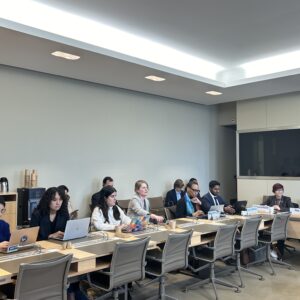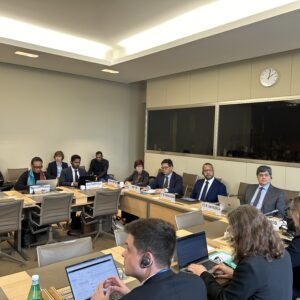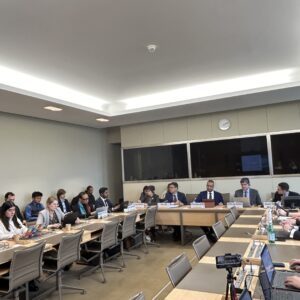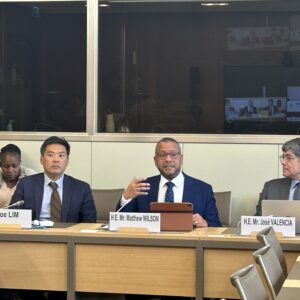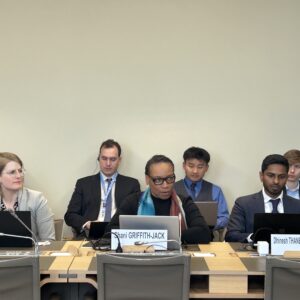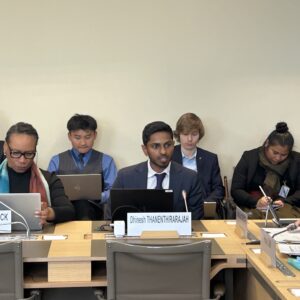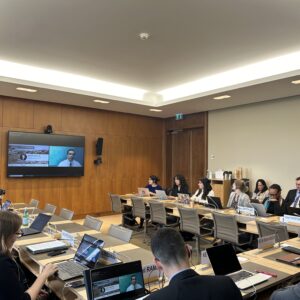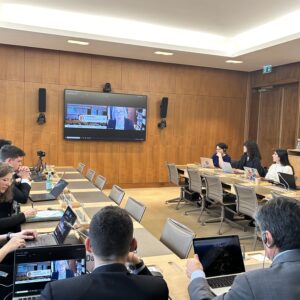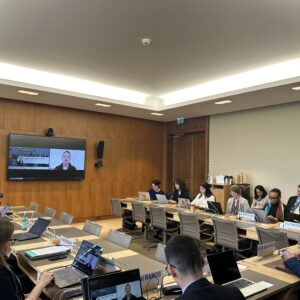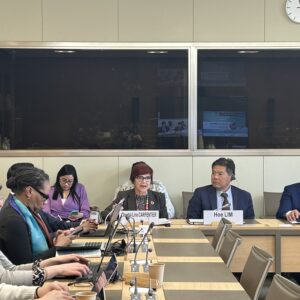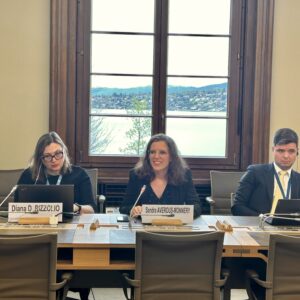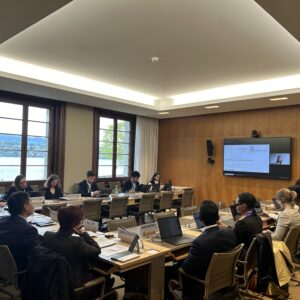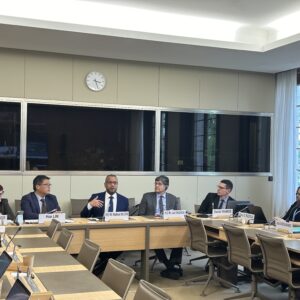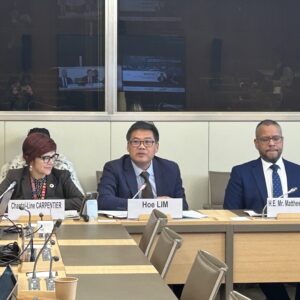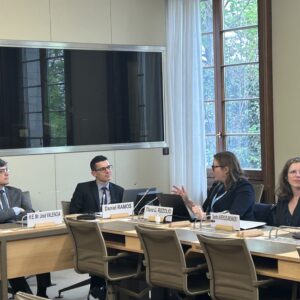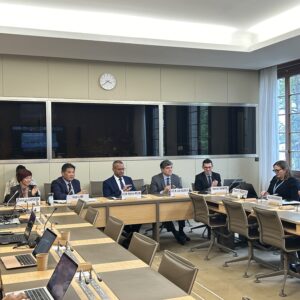Event Conference
Plastics Pollution and Environmentally Sustainable Plastics Trade: Call for Action
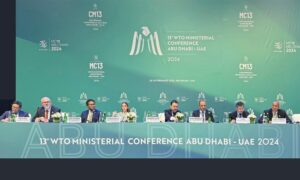
09 Apr 2024
14:00–15:30
Venue: WTO | Room B and Online | Webex
Organization: World Trade Organization, Geneva Environment Network
This event, co-organized with the World Trade Organization (WTO), within the framework of the Geneva Beat Plastic Pollution Dialogues, discussed the WTO Dialogue on Plastics Pollution and Environmentally Sustainable Plastics Trade Ministerial Statement released earlier this year at the WTO Ministerial Conference and how harnessing trade can contribute to end plastic pollution.

About this Session
A group of WTO members launched in November 2020 an initiative to explore how the WTO could contribute to efforts to reduce plastics pollution and promote the transition to more environmentally sustainable trade in plastics. The Dialogue on Plastics Pollution and Environmentally Sustainable Plastics Trade (DPP) is open to all WTO members and seeks to complement discussions in the Committee on Trade and Environment (CTE) and other fora.
In February 2024, for the WTO’s 13th Ministerial Conference (MC13) a Ministerial Statement (WT/MIN(24)/14) was shared containing a series of principles and actions to ensure trade is part of the solution to the growing plastic pollution challenge, including to increase transparency of trade flows of plastics (e.g. of single-use plastics, plastic films and hard-to-recycle plastics), to reduce plastics and plastic products that are harmful to the environment or human health, or unnecessary single-use plastics and plastics packaging, associated with international trade that are not essential for medical or sanitary purposes, and to promote potential non-plastic substitutes, re-use/re-fill systems and technologies needed for the safe and sustainable management of plastic wastes. Related to each agreed action, a factual compilation document (INF/TE/IDP/RD/146/Rev.1) is attached to the Statement, consisting of trade-related practices already being adopted to tackle plastics pollution.
As of February 2024, 78 WTO members co-sponsor the dialogue, representing over 85 per cent of global trade.
This event, organized within the framework of the Geneva Beat Plastic Pollution Dialogues, presented the MC13 outcomes related to the Dialogue on Plastics Pollution and Environmentally Sustainable Plastics Trade (DPP) and explored the next steps of the initiative. This session also provided a space for stakeholders to discuss further the role of trade and of the DPP as part of the solution to end plastic pollution, responding to the call to action launched by Ministers at MC13.
Geneva Beat Plastic Pollution Dialogues

The world is facing a plastic crisis, the status quo is not an option. Plastic pollution is a serious issue of global concern which requires an urgent and international response involving all relevant actors at different levels. Many initiatives, projects and governance responses and options have been developed to tackle this major environmental problem, but we are still unable to cope with the amount of plastic we generate. In addition, there is a lack of coordination which can better lead to a more effective and efficient response.
Various actors in Geneva are engaged in rethinking the way we manufacture, use, trade and manage plastics. The Geneva Beat Plastic Pollution Dialogues aim at outreaching and creating synergies among these actors, highlighting efforts made by intergovernmental organizations, governments, businesses, the scientific community, civil society and individuals in the hope of informing and creating synergies and coordinated actions. The dialogues highlight what the different stakeholders in Geneva and beyond have achieved at all levels, present the latest research and governance options.
Following the landmark resolution adopted at UNEA-5 to end plastic pollution and building on the outcomes of the first two series, the third series of dialogues will encourage increased engagement of the Geneva community with future negotiations on the matter.
Speakers

H.E. Amb. José VALENCIA
Permanent Representative of Ecuador to the World Trade Organization & Chair, Committee on Trade and Environment
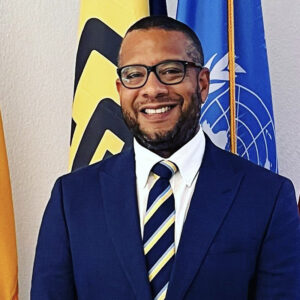
H.E. Amb. Matthew WILSON
Permanent Representative of Barbados to the World Trade Organization

Daniela GARCIA FREIRE
Deputy Permanent Representative of Ecuador to the World Trade Organization & Coordinator, Dialogue on Plastics Pollution and Environmentally Sustainable Plastics Trade

Shani GRIFFITH-JACK
First Secretary, Permanent Mission of Barbados to the United Nations Office and other international organizations in Geneva

Dhinesh THANENTHIRARAJAH
Third Secretary, Australia's Permanent Mission to the World Trade Organization

Mahesh SUGATHAN
Senior Policy Advisor, Forum on Trade, Environment and the SDGs (TESS)

Gael GROOBY
Deputy Director, Tariff and Trade Affairs, World Customs Organization

Megan JUNGWIWATTANAPORN
Conservation Support Officer, The Pew Charitable Trusts

Chantal-Line CARPENTIER
Head, Trade, Environment, Climate Change, and Sustainable Development, UN Conference on Trade and Development
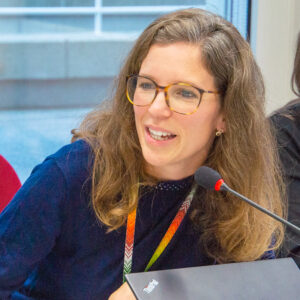
Sandra AVEROUS-MONNERY
Economic Officer, World Trade Organization (on secondment from UNEP)

Juliette VOINOV KOHLER
Senior Legal Officer and Chief (officer-in-charge), Governance Branch, Basel, Rotterdam and Stockholm Conventions
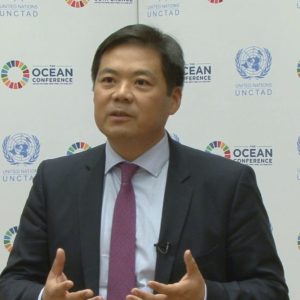
Aik Hoe LIM
Director, Trade and Environment Division, World Trade Organization

Daniel RAMOS
Secretary to the Dialogue on Plastics Pollution, World Trade Organization | Moderator
Summary
Welcome | Diana RIZZOLIO | Coordinator, Geneva Environment Network
- The World Trade Organization and its members have regularly contributed to the Geneva Beat Plastic Pollution Dialogues. The third series of dialogues kicked off after the adoption two years ago of a historic resolution at the United Nations Environment Assembly setting up the path to a global treaty to end plastic pollution.
- An important milestone in the drafting of the resolution was a Ministerial Conference on marine litter and plastic pollution co-organized by the governments of Ecuador Germany Ghana and Vietnam that was hosted here at the world trade organization in September 2021, which led to the first draft of the historical resolution tabled by the governments of Peru and Rwanda.
- While all eyes are on the intergovernmental negotiating committee (INC) to develop this International legally binding instrument, today’s event is the occasion to remember that in the multilateral system we have other processes contributing to tackling plastic pollution.
- In Geneva, plastics is addressed in many fora and these various multilateral processes also contribute and engage in the INC process.
- Today’s dialogue will present and discuss the WTO Dialogue on Plastics Pollution and Environmentally Sustainable Plastics Trade (DPP) Ministerial Statement released at the 13th WTO Ministerial Conference and how trade can contribute to end the plastic pollution.
Opening Remarks
H.E. Amb. José VALENCIA | Permanent Representative of Ecuador to the World Trade Organization & Chair, Committee on Trade and Environment
- This event marks a significant milestone in our collective journey towards a greener future.
- We are all engaged in the same purpose, following the same path and this collaboration is essential to tackle plastic pollution as this issue transcends national boundaries. Plastic pollution is affecting ecosystems and communities worldwide.
- Trade in plastic constitutes 5% of global international trade, underscoring the importance of trade in addressing the plastics crisis.
- Statistics highlight the imperative of international cooperation and coordination among member states. We must confront the plastic pollution crisis addressing its detrimental effects on human health and the environment.
- The challenge of ending plastic pollution necessitates a collaborative approach, one that spans international supply chains and promotes sustainability throughout the entire lifecycle of plastics.
- It is essential that we critically analyze and evaluate other strategies, taking advantage of the latest advancements in science, technology and knowledge. Future action must also consider the diverse priorities of developing countries, ensuring that efforts are inclusive and equitable.
- The DPP Ministerial Statement (WT/MIN(24)/14) illuminates the various ways in which governments are implementing trade-related actions on and measures to combat to combat plastics pollution. These developments signal an opportunity for enhanced cooperation on trade and plastic pollution: an avenue through which we can collectively make significant strides.
- Ecuador is one of the coordinators and since its inception in 2019, the DPP has evolved from exploratory discussions to the implementation of concrete pragmatic and effective solutions. This evolution is captured in the MC13 Ministerial Statement.
The dialogue represents the WTO’s largest environmental initiative, predominantly supported by developing countries. It is a testament to our commitment to an open, inclusive and collaborative process engaging a wide array of stakeholders from International Organizations and civil society.
- Looking ahead, future endeavors will focus on implementing the MC13 Ministerial Statement during technical discussions and achieving tangible outcomes. This work will be conducted in an open, inclusive and transparent manner, drawing on insights lessons and evidence to highlight the critical role of trade and trade measures in addressing plastic pollution and fostering sustainable development.
- The DPP has demonstrated its potential to inform and support the INC and to enhance collaboration with ongoing processes such as the revision of the World Customs Organization Harmonized System and the implementation of international agreements like the Basel Convention.
- Together we possess the collective wisdom, resources and determination to make a meaningful impact. Let’s seize this opportunity to forge a path towards a sustainable future free from the scourge of plastic pollution, finding creative solutions for this complex matter.
H.E. Amb. Matthew WILSON | Permanent Representative of Barbados to the World Trade Organization
- The voices of Civil Society, think tanks and academia are crucial on this issue.
- Our relationship with plastics is complicated. We all appreciate its convenience, affordability and its multiple uses but with despise its effect on our oceans, waterways, health and ecology.
- In addressing the harmful impacts of single-use plastics, trade has a role to play along with consumption changes, investing in plastic substitutes, paying attention to subsidies, primary plastic production including fossil fuel subsidies and supporting developing countries, especially LDCs and SIDs to transition to more sustainable consumption patterns.
- Another key requirement for the purpose of ending plastic pollution is collaborating with the private sector and the big brands to get them to see why they need to cut down on single-use plastics.
- A world free of plastics is unrealistic. According to the World Bank, plastics are here to stay and if we do nothing to combat plastics pollution, production of plastics will triple from 460 million tons in 2019, reaching around 1,100 million tons by 2050.
- According to OECD, global plastic waste driven by plastics produced with a short lifespan – such as packaging and construction- will surge to 1,4 million tons in 2060.
- Global exports of plastic goods have more than doubled in value since 2015 and will stand at nearly 1.2 trillion USD in 2021. Despite the recognition of the negative contribution of single-use plastics, we have quite a journey ahead of us.
- DPP discussions demonstrate the critical role that the WTO and trade can play in shaping trade-related interventions and in setting clear pathways for sustainable plastics trade.
- The DPP MC13 Ministerial Statement is a product of a real inclusive multi-stakeholder process. It benefitted from more than 600 comments from participating members and more than 1,000 comments from DPP stakeholders. Highlights of th e statement include:
- Despite the positive role played by plastics in society, there is the universal negative impact that plastics pollution has on the environment, particularly in small vulnerable economies, especially in SIDs and LDCs, including the blue economy as marine litter, human health the economy.
- This is one of the first statements in the WTO to specifically recognize the particularities of SIDs.
- It validates the extremely positive and inclusive work of the dialogue over the last two years and lays the groundwork for post MC13 and serves as a real contribution to the INC process.
- Nor WTO, UNEP, Academia, or any single actor can tackle the plastic pollution crisis alone. There must be a dialogue and a movement based on partnerships.
- The actions outlined in the Ministerial Statement – voluntary in nature – have largely been drawn from the results of surveys revealed: that WTO members are already doing many things at the national, regional and international levels that are replicable and scalable. We need to build on that as we simply cannot afford to stand still.
- We have committed to engage in these dedicated discussions aimed at identifying best practices and sharing experiences on a range of topics identified by the dialogue as well as to contribute and ensure we incorporate trade-related results of the INC negotiations in the DPP and vice versa. Our technical experts have already started to examine possible concrete pragmatic and effective outcomes for delivery post-MC13 and leading up to MC14.
Presentation of the MC13 Ministerial Declaration
Shani GRIFFITH-JACK | First Secretary, Permanent Mission of Barbados to the United Nations Office and other international organizations
- Throughout the discussions in the dialogue, there is a common realization that trade is a part of the problem, but also that it can and must be a part of the solution to address plastics pollution.
- The development of the MC13 Ministerial Statement and the continued work ahead in the discussions of the DPP are a shared commitment to work towards concrete, pragmatic and effective outcomes on trade-related aspects of plastics pollution to contribute to the global response against plastics pollution.
- In furthering this commitment, the MC13 statement sets out a range of principles and six actions where trade can be a key contributor to the response required. Each action is linked to a factual compilation that is attached to the statement the elements of which consist of trade-related practices already adaptod by the WTO members in tackling plastics pollution. Examples include:
Action One | Improving transparency, monitoring and understanding of trade flows throughout the value chain of plastics.
- The related compilation document brings examples of the breakdown of the domestic customs classification to facilitate monitoring, evaluation, reporting, and regulation of trade and support the World Customs Organization in its efforts. Discussions and surveys conducted over the last two and a half years provide information on the identification of customs-related technological solutions. Technology is one of the core areas that emerged during discussions along with how to cooperate with the private sector on standards product identifiers and other applications to identify trade flows across the lifecycle of plastics.
Action Two | Improving the capacity of developing countries to use trade as a tool to tackle plastic pollution and better match existing funding with trade-related needs.
- Many developing countries are making efforts nationally to fight plastic pollution. Membership is a reflection of the need for developing countries to understand and be able to participate in these discussions. The compilation highlights issues that members deem critical and need to be included as specific technical assistance and capacity building: participation in the global aid for trade review; currently under discussion with the coordinators, focusing on how this can potentially help insert the elements of the dialogue, sharing experiences organizing training sessions and how domestic private sector engagement and partnerships can be highlighted to the benefit of developing countries; access to technology; civil society engagement; and technical assistance on policy implementation.
Action Three | Promoting cooperative and effective trade-related plastic measures to reduce plastics and plastic products harmful to the environment and human health or unnecessary single-use plastic and plastic packaging associated with international trade that are not essential for medical or sanitary purposes.
- The compilation highlights examples of most targeted goods in trade-related plastic measures such as packaging and single-use plastic products.
Dhinesh THANENTHIRARAJAH | Third Secretary, Australia’s Permanent Mission to the World Trade Organization
Action Four | Need to promote cooperative and effective trade-related plastic measures to address the environmental, social and human health impacts and leakages across the lifecycle of plastics, plastic products and their constituents.
- The factual compilation in the MC13 statement identified the most often used specific trade-related Plastics measures, falling under four categories:
- technical regulations (eco-design and labeling requirements);
- bans and prohibitions, which could target single-use plastics;
- measures identified under import and export licenses such as waste management and leakage avoidance;
- internal taxes such as repurposing measures.
Action Five | Promote environmentally sound, safe and effective action on non-plastic substitutes, alternative services and technologies.
- Considered support measures could include grants and direct payments, preference in public procurement, tax concessions, and non-monetary support. Reduction must be coordinated with actions toward promoting appropriate alternatives. Measures already considered by members are captured in the factual compilation of substitutes including algae, bamboo and glass.
Action Six | Trade-related corporations to contribute to the control of transboundary movement of plastic pollution.
- Recognizing the multistakeholder nature of action, this action values the effective implementation of the Basel Convention on Plastic Waste Amendments and its plastic technical guidelines.
Daniela GARCIA FREIRE | Deputy Permanent Representative of Ecuador to the World Trade Organization & Coordinator, Dialogue on Plastics Pollution and Environmentally Sustainable Plastics Trade
- To discuss the next steps for the DPP, a meeting is organized on 12 April 2024 to discuss the shared vision for a work plan for implementing the MC13 statement.
- The plan aims to implement the ministerial statement through concrete, pragmatic and effective outcomes on actions by MC14.
- As part of the declaration, we aim to host two plenary sessions and three pre-plenary session meetings in 2024.
- The plan will take advantage of the great expertise of our stakeholders to inform the participation of the members of the dialogue.
- We will maintain the three work streams:
- cross-cutting issues (e.g. transparency, technical assistance);
- promoting trade to tackle plastic pollution (e.g. waste management technologies, plastic substitutes);
- and reduction to tackle plastic pollution and circular economy for plastics – with Switzerland as a new co-facilitator.
- The dialogue remains open to all members and we look forward to working in an inclusive, transparent and efficient way towards pragmatic and concrete outcomes in MC14.
- The dialogue has been an example of how to break silos while maintaining coherence and calling concrete action in the trade arena to tackle environmental challenges.
Panel Discussion
How Trade Can be a Tool to Address Plastic Pollution
Mahesh SUGATHAN | Senior Policy Advisor, Forum on Trade, Environment and the SDGs (TESS)
- TESS perceives the work of the DPP and its recent ministerial statement at MC13 as an important contribution to global efforts to tackle plastic pollution.
- MC13 Ministerial Statement includes a commitment by members to step up individual and collective trade related action on a voluntary basis and through international cooperation to address plastic pollution.
- The engagement of trade ministries and trade policy experts, alongside environment and other ministries, to enhance trade related cooperation on plastic pollution is important as ending plastic pollution will require transformation of the plastics economy, reshaping production and consumption across a full life cycle of plastics and plastic products.
- Recent research has highlighted that international trade plays a key role across the full lifecycle of plastics. Transforming the plastics economy will also increase international cooperation on trade for which a better understanding of various aspects of plastics trade is key, including types of trade policies and regulations.
- Trade will play a role in restricting or eliminating the most problematic plastics types or harmful to human health and environment, as well as unnecessary plastics; and in expanding access to an uptake of technology services and other goods that can support efforts to address plastic pollution such as environmentally sound and safe plastic waste management goods and services, technologies for greener production processes and environmentally sound safe and effective non-plastic substitutes.
- The DPP’s 78 members includethe world’s largest economies members from all regions and all levels of development including LDC and SIDs.
- Another key feature of the DPP process is that meetings and compilations have drawn together information on actions and initiatives already being pursued or being intended to be pursued by WTO member states.
- The ministerial statement can provide both information and inspiration to the environment negotiators and policy makers involved in the international legally binding instrument on plastic pollution negotiations.
- The shift from identifying issues to forging action on concrete outcomes will be a priority in the coming months and WTO members will need to be prepared to consider which of the listed actions in the ministerial statement they can come forward with examples, suggestions, commitments or pledges.
- There is already considerable experience and expertise on trade-related measures and opportunities for cooperation that can be built on.
Increasing Transparency of Trade Flows in Plastics
Gael GROOBY | Deputy Director, Tariff and Trade Affairs, World Customs Organization
- The work done at MC13 evidence that the problems related to the scourge of plastics moving through trade are not going to be addressed or solved by seeking to influence consumption side alone if production and trade of non-essential plastics continues at unsustainable levels.
- Enabling the transformation to an environmentally sustainable trade is essential and the World Customs Organization and its members can help achieve greater transparency in monitoring and understanding trade flows and the successful implementation of concrete measures at borders.
- Customs organizations are critical to the success of any governmental border measures.
- The collaboration with WTO and various MS involved in the DPP aims to create greater transparency by proposing the separate identification of various goods within the scope of the statement and within the International Convention on the Harmonized Commodity Description and Coding System (HS), which is used for the classification of goods.
- The advantage of separate identification in the HS for a particular type of goods means allows monitoring the amounts of these goods that flow in and out of countries through the data on customs declarations and it enables countries to apply measures without separate identification.
- Work through the HS review subcommittee is likely heading towards the introduction of new subheadings to better identify goods of interest for HS 2028. This will increase the available information on the trade in these commodities and where when concrete measures may be implemented. It also reduces the likelihood of differing definitions at national borders which can create substantial difficulties for industry compliance and planning.
- We encourage trade and environment administrations to work with their customs administrations to make further proposals while drafting negotiations for HS 2028.
- While in these opening proposals include separate identification of polymers of interest or non-plastic alternatives based on their biodegradability characteristics, and their renewable sources, this is not actually extended to include proposals for differentiating between virgin and recycled plastics nor differentiations based on the actual biodegradability. This limited coverage relates to the varying degrees of technical difficulties in verifying the identification of preferable plastics and recycled plastics at the border. These can include difficulties in finding suitable analytical methods the absence of clear and universally accepted standards and the high use of additives and plastics that can affect their environmental impact.
- While the separate identification of the preferable plastic this proposed is a very useful step forward more work is needed.
- WCO and its members have been working very successfully with the Basel Convention Secretariat for better distinguishing hazardous plastic waste subject to Basel Convention Procedures.
- HS and WCO work on multiple fronts to improve procedures and compliance in relation to the trade of plastic waste or the trade to help again ensure that the trade of these goods is properly managed.
- Illegally traded goods are another side of customs work. Work has been ongoing to improve enforcement in the ongoing fight against cross border environmental crime.
- While the triple planetary crisis poses an existential crisis, the scale of the threat can’t paralyze us. It is only by countries working together on the DPP and on the INC negotiations and further that we can prove the ability of human ingenuity to overcome challenges.
Reducing Harmful or Unnecessary Single-Use Plastics and Plastic Packaging
Megan JUNGWIWATTANAPORN | Conservation Support Officer, The Pew Charitable Trusts
- The Pew Charitable Trust has been an observer of the DPP for the past two years and shared research showing that it is possible to reduce plastic pollution by 80% by 2040 with the solutions already available.
- Pew research also shows that cutting plastic pollution will require a system change. Key messages for its success include:
- Single-use plastics and plastics packaging are highly polluting and need to be addressed immediately.
This could happen by eliminating them or replaced by reusable items. Beach cleanup data shows that single-use plastic items are predominant and contribute to macroplastic pollution. Pew has found that five product types are responsible for 85% of plastic leakage: monomaterial films carrier bags; bottles; sachet; multi-layer films and household goods. The Nordic Council of Ministers notes that a key driver in reducing plastic production and consumption is a shift away from single-use plastics, encouraging bans on avoidable single-use plastics. WWF report Breaking Down High-Risk Plastics identifies high-risk plastic products with packaging as one of the worst offenders. Design and packaging choices often do not account for local infrastructure: globalized supply chains of consumer goods fail to account for the realities of local waste management infrastructure available to deal with them meaning packaging is often not recycled becomes litter and the value of plastic packaging is lost to the economy after a single use cycle. - Many WTO members are already working on these items through trade-related plastic measures.
- The DPP has an opportunity to make a difference at the global plastic treaty negotiations and at MC14, especially if it focuses its work on a handful of select issues that enable members to take action: single-use plastics and packaging.
- The MC13 Ministerial Statement and its related factual compilations serve as a useful indication of work already underway. The DPP work up to now provides the foundation and now we need to build out the structure. Factual compilations inform on thematic areas that might be ripe for greater cooperative action. Single-use plastic and packaging are products that are most often identified in current trade-related plastic measures and would be good candidates for deeper discussion among members.
- The International Institute for Sustainable Development (IISD) report assessed 93 trade-related plastic measures reported by WTO members between 2009-2021. bans on single-use plastic items appeared as the most frequent action.
- While these have been concentrated on a relatively small number of product categories and primarily through non-harmonized bans, thus a harmonized work plan could help the DPP to facilitate discussions to expand measures geographically or thematically.
- This could help members uptake actions already taken by others, allowing new measures to enhance effectiveness or minimize disruption.
- While there’s necessarily an interconnectedness between the work of the DPP and work in other environmental bodies such as the INC, there’s a need for dedicated trade discussions to deal with plastic pollution.
Latest Work on Safe and Sustainable Non-Plastics Substitutes, Alternatives, Technologies and Services
Chantal-Line CARPENTIER | Head, Trade, Environment, Climate Change, and Sustainable Development, UN Conference on Trade and Development
- The DPP has been successfully addressing plastic beyond a siloed approach but contextualizing it in the triple planetary crisis.
- Investment trends are also a key aspect of the system change required to end plastic pollution. If investment in non-plastic substitutes t could impact biodiversity or investment in alternative plastics could give a second life to some of the fossil fuel-based plastics, environmental goals will be hard to achieve.
- A database of plastic substitutes using the 282 HS code is under development to complement the existing plastic trade database. This shows 269 million tons of plastics have been traded in 2021 alone, 0.2% of which is traded plastic scrap due to lack of capacity to recycle.
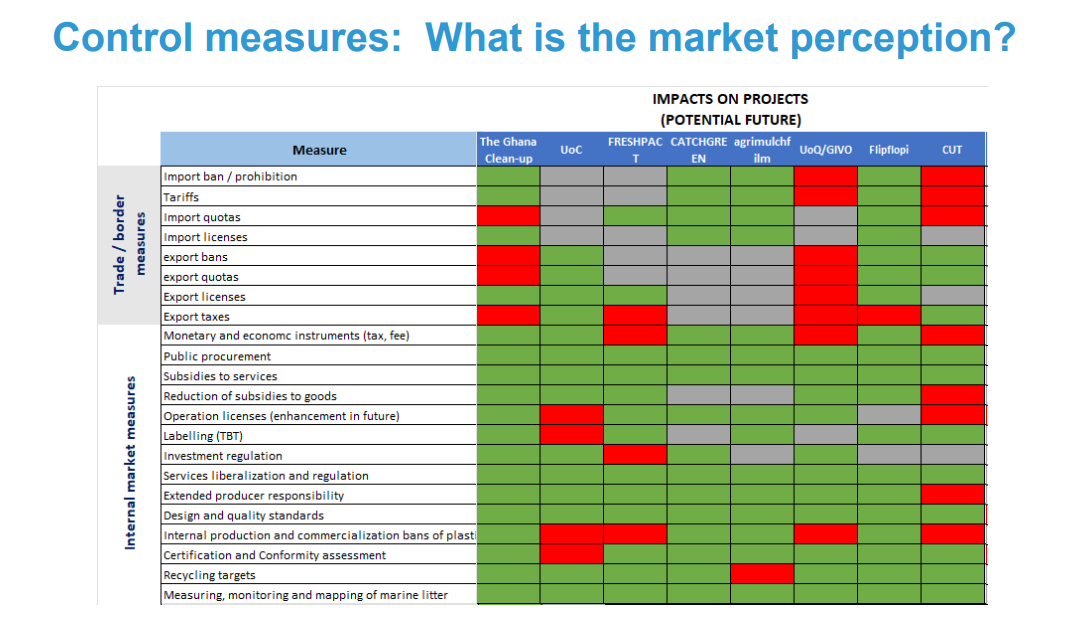
- World trade in plastics is around 1 billion, with plastics substitutes accounting for one third and plastics alternatives less than 1%.
- Entrepreneurs and start-ups are developing those alternatives. We asked them whether trade measures, including those proposed in the DPP, would help or impinge their work and they see these as positive for their business.
- A study will be published shortly on the notification to WTO. It notes that trade-related policy measure on non-plastic substitutes is going faster than others, which could further constrain their trading.
- It is important to look at what the environmental impact of removing plastics from the environment are. These are not measured in dollars but in days and years of saved lives, showing the importance of not offsetting the environmental impact of plastics elsewhere.
- UNCTAD will continue to look at the evidence base in terms of mapping plastic substitutes. Cooperation continues also with ISO on biodegradable and compostable plastics, health issues and technical assistance for developing countries.
Environmental Perspective
Sandra AVEROUS-MONNERY | Economic Officer, World Trade Organization (on secondment from UNEP)
- According to the OECD, 460 million tons of plastics are produced annually. This number could triple by 2050. Out of these 460 million tons of plastic, 30 million tons are secondary plastics.
- Plastic pollution is having important impacts to the triple planetary crisis of climate change, pollution and biodiversity loss.
- Plastics are filling the ocean and even working their way into the food chains through fish. Pollution can both be visible and invisible, with the latter linked to toxicity, chemicals in plastics or microplastics in waterways. The recently published PlastChem report found about 16,000 plastic chemicals with at least 4,200 of those highly hazardous to human health and the environment while last year’s UNEP’s report Chemicals in Plastics found about 13,000 chemicals, evidencing a growth.
- Plastic pollution impacts biodiversity and ecosystems. Target Seven of the Kunming-Montreal Biodiversity Framework focuses on reducing pollution to levels that are not harmful to biodiversity and specifically calls for preventing, reducing and working towards the elimination of plastic pollution by 2030 and finally.
- The production of plastic is one of the most energy-intensive manufacturing processes. In 2019 plastic generated 1.8 billion metric tons of greenhouse gas emissions, representing 3.4% of global emissions.
- The DPP ministerial sends a strong signal and outlines concrete actions from the trade minister to contribute towards addressing the growing environmental, health and economic costs of plastic pollution.
- It expresses deep concern about the triple planetary crisis and recognizes that these challenges are interlinked, reinforced and driven largely by unsustainable patterns of consumption, production and disposal and their related economic and health costs.
- It acknowledges the adverse effects on of plastic pollution and plastic waste and the negative impacts on the environment.
Environmentally-relevant actions in the Ministerial Statement:
- Reduction of unnecessary single-use plastic and plastic packaging would allow the prevention of plastic pollution and lower pressure on the environment.
- Transparency will further inform decision-makers and facilitate monitoring, evaluation, reporting and regulation of trade in polymers, chemicals, and plastic products.
- The statement shows the readiness of the trade community to act and respond to the UNEA resolution 5/14.
- Members of the DPP have been putting into practice the Marrakesh Agreement and will continue to highlight the role of trade in achieving the objective of sustainable development and the need to protect and preserve the environment from plastic pollution.
It’s time for more effective, concrete and pragmatic actions and display how trade and environment can be mutually supportive to address the challenges of our times.
Cooperation between the Plastics Dialogue and Other Ongoing International Processes
Juliette VOINOV KOHLER | Senior Legal Officer and Chief (officer-in-charge), Governance Branch, Basel, Rotterdam and Stockholm Conventions
BRS Conventions and cooperation.
- Cooperation with ongoing international processes is alive and kicking.
- Showing the scope and breadth of the number of WTO members working through the Basel, Rotterdam, and Stockholm Convention to address the plastic pollution crisis through trade.
- Basel Convention: 191 Parties; addresses environmentally sound management (ESM) of waste, where at the heart is the PIC procedure for the control of transboundary movements.
- Rotterdam Convention: 166 Parties; promote information exchange on chemicals of concern, with PIC procedure for trade in chemicals
- Stockholm Convention: 186 Parties; addresses specific types of chemicals called persistent organic pollutants (POPs), where the goal is to restrict or eliminate production and international trade of these chemicals.
- The protection of human health and the environment is what brings these three treaties together to try to promote the lifecycle approach to chemicals of most concern.
- In the world of cooperation between the BRS Conventions and the INC process, what the BRS Conventions can bring to the process are the following pillars of the Basel and Stockholm Conventions:
-
- Control of transboundary movements of plastic waste
- Obligations to minimize waste generation and ensure ESM of plastic waste
- Looking at the most hazardous constituents (additives) added to plastics which are used for better plastic products, but are problematic to human health and the environment.
Plastic Waste Amendments.
- Mentioned in the Ministerial Statement, these amendments that were adopted in BC-14/12 and made effective 1 January 2021, have ensured that the different types of plastic waste have been classified in accordance with perceived or actual concern to human health and the environment (Annex II & VIII) and those not viewed with concern (Annex IX). → Read more on Plastic waste and the Basel Convention
Technical guidelines on ESM of plastic waste.
- Adopted in 2023, the technical guidelines can help Parties with the classification of plastic waste (important as depending on which Annex they fit, the obligations of Parties will defer). It also provides guidance on how to adjust provide legislative and regulatory frameworks at the national level to incorporate the Plastic Waste Amendments, and gives guidance on the different pillars of the BC.
- Linking these guidelines with the control of international trade, these are useful for any Party that generate domestic plastic waste to know how best to manage waste through ESM. However, the control of international trade of waste hinges on the definition of ESM of plastic waste, because the trade should not take place if there is not a contract between the exporter and the importer defining and ensuring that waste will be managed ESM – the guidelines can help determine this.
- As such, the guidelines have a dual purpose: to ensure ESM in plastic waste generated and to make sure that the trade of plastic waste relies in a guarantee that the waste will not just be dumped at the end of the transfer.
Plastics-related chemicals under SC.
Among the 34 POPs listed, 17 are plastics-related chemicals, with two under review. SC is already used as a tool to target the most harmful chemicals in plastic production. Through the SC, one can address at source the most challenging chemicals used in producing plastics.
Support for implementation provided by BRS. Prevention and minimization, waste management, controlling trade in plastic waste, hazardous constituents:
- On the work on improving the PIC procedure under BC, it is of interest to the WTO community and beyond to see whether there are challenges in implementing the PIC procedure and how these are overcome.
- Digitalization of control procedure under BC.
- Among others
It’s equally important to have Member States cooperate at the national level. By having both levels of coordination across the board, we can do the right thing.
Open Discussion
Q: Where to find the UNCTAD report on the different life expectancies?
Chantal-Line Carpentier: It’s still in the process and will be released in a few months [from the date of this webinar].
Q: What steps would you recommend for any civil society willing to work towards an environmentally sustainable plastics trade in developing countries?
Chantal-Line Carpentier: When we work in developing countries, civil society is important in the policymaking process and the “acceptability”. They can register to be part of civil society under UNCTAD and come to the Conference, or contact UNCTAD directly to see how we can help them help us. As the Ambassadors have said, we have to do it altogether.
H.E. Amb. Matthew Wilson: First, to support micro, small to medium enterprises (MSMEs) (and entrepreneurs, as noted by Chantal-Line Carpentier) who are involved in developing plastic substitutes and alternatives, and especially support them to use indigenous materials to do so.
In the Caribbean, we are exploring using coconut husks for plastic substitutes. We are looking at seaweed as possible substitutes and alternatives. You need to support homegrown MSMEs in developing countries to see this as a viable economic strategy for them.
Second, get youth on board. This is where a lot of the momentum will come from. We need to get them involved and give them tools to become real advocates for this. In relation, educating the population and helping them understand the implications of their choices and consumer preferences will be key.
Third, lobby your government to support MSMEs to get access to finance, as this is one of the fundamental barriers for MSMEs to be able to invest in new lines of production and innovative work. Lobby private sector in developing countries to lead by example.
In Barbados, for example, the regulation on banning single-use plastic (SUP) bags, what really helped was some big supermarket chains having the most beautiful reusable bags for customers to use, which spoke to the sensibility of the population.
Q: What is the role of consumers in this effort?
Daniel Ramos: From the example mentioned, consumers do react and respond when there is something that is available to them that is available, useful, and user-friendly.
Closing Remarks
Aik Hoe LIM | Director, Trade and Environment Division, WTO
- The Dialogue on Plastics journey has been quite a journey. When it became a topic brought to the WTO, it was not obvious for WTO members and trade experts on what it would be about, how this dialogue will work, and what it would produce.
- It is to the credit of stakeholders to make this from an idea, to a dialogue, to a process, and to a Ministerial Statement with actions.
- Within the WTO context, this has been remarkably fast. What has it happened quickly? Because of the urgency, a strong collective will to address this urgency, and some pathways to systems change away from pollution from plastics is not possible without cooperation.
- When thinking about the continued call to action, we need to think about substance and form.
- We’ve heard a lot about substance: Ministerial State and accompanying annexes have a lot of substance. Now, this action has to be accompanied by a little bit more thinking on what form this action will take.
- Collective creative thinking will be required, as this is a non-traditional dialogue from the WTO perspective. What would this form of action take? We’ve had examples from other UN fora and organizations with different types of commitments and actions.
- We have already committed to work on this with the timeline to deliver by the WTO Ministerial Conference in at least two years’ time.
- On what these actions can be, the three big ones are:
- Reduction. We must reduce the consumption and production of plastics. There are different ways to think about that using trade tools. Though these remain the same, the question is about adapting them to this challenge.
- Promoting trade. There are different ways to promote sustainable trade. This calls for the need to look at alternatives, substitutes, etc. Using trade policy as an important lever to promote this.
- Cross-cutting issues. Much of the work here, to make it possible, requires cooperation with other international processes – from the WCO, INC, BRS Conventions, etc. Another issue not heard much today is the need for solutions that deal with capacity-building and tailored technical assistance to create opportunities from this transition from an economy that is polluting to an economy that is much more sustainable.
Highlights
Video
Live on Facebook

